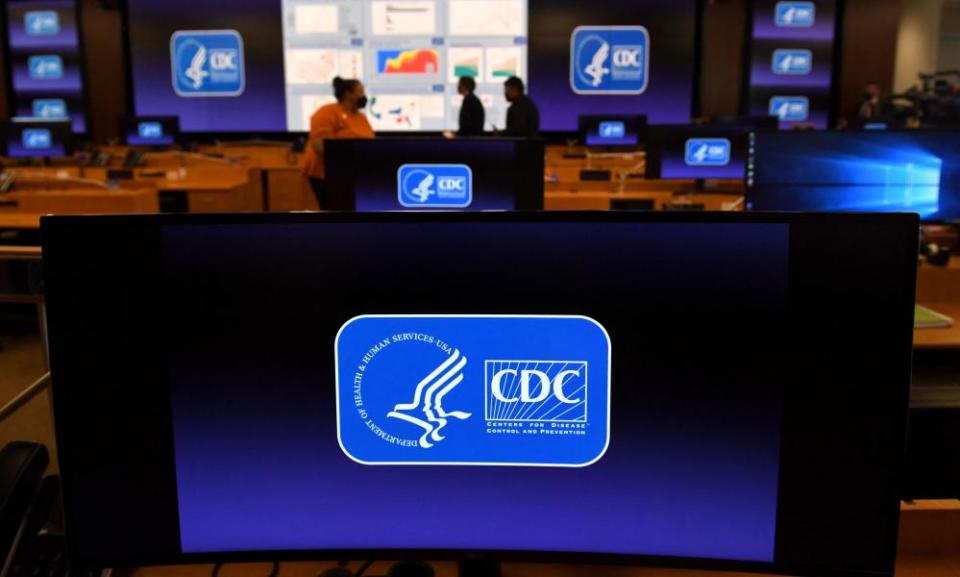CDC advises vaccinated people to wear masks indoors in Delta surge areas

The nation’s top health agency revised its mask guidance on Tuesday and now recommends fully vaccinated Americans wear masks indoors in certain places.
In a shift from its earlier guidance issued on 13 May, which said vaccinated individuals did not need to wear masks in most indoor settings, the Centers for Disease Control and Prevention (CDC) now advises Americans to wear a mask in “public indoor settings” with “substantial and high transmission”. This comes amid a surge in Covid cases as the highly contagious Delta variant has become more prevalent.
Related: California and New York City to mandate vaccine for government workers
Tuesday’s updated guidelines come two months after the CDC revised its mask guidance for vaccinated people. The guidance, which still called for wearing masks in crowded indoor settings, like buses, planes, hospitals, prisoners and homeless shelters, had cleared the way for reopening workplaces and other venues.
Watch: Where do I need to wear a mask now restrictions have eased?
The CDC now recommends that fully vaccinated people living with vulnerable household members such as those who are immunocompromised and children wear masks in indoor public spaces. In addition, the agency recommended everyone in K-12 schools wear masks, “including teachers, staff, students and visitors, regardless of vaccination status”, said the CDC director, Dr Rochelle Walensky, in a press briefing on Tuesday.
“In recent days I have seen new scientific data from recent outbreak investigations showing that the Delta variant behaves uniquely differently from past strains of the virus that cause Covid-19,” Walensky said, referring to scientists’ discovery of the Delta strain shedding as actively in breakthrough infections as it does in unvaccinated individuals, despite the rarity of breakthrough cases.
For months Covid cases, deaths and hospitalizations were falling steadily, but the highly infectious Delta variant of the coronavirus has fueled steep rises in case numbers, particularly among unvaccinated Americans and amid struggles with disinformation and resistance, particularly on the political right.
“Nobody wants to go backward but you have to deal with the facts on the ground, and the facts on the ground are that it’s a pretty scary time and there are a lot of vulnerable people,” Robert Wachter, chairman of the department of medicine at the University of California, San Francisco, told the Washington Post.
“I think the biggest thing we got wrong was not anticipating that 30% of the country would choose not to be vaccinated.”
In recent weeks, a growing number of cities and towns have restored indoor masking rules. St Louis, Savannah, Georgia, and Provincetown, Massachusetts, are among the places that reimposed mask mandates this month.
Watch: Do coronavirus vaccines affect fertility?
At a White House briefing last week, the surgeon general, Vivek Murthy, said 97% of hospital admissions and 99.5% of Covid deaths were occurring among unvaccinated people.
More than 162.7 million Americans are vaccinated – or 49% of the population, according to the CDC.
California and New York City announced on Monday that they would require all government employees to get the coronavirus vaccine or face weekly Covid-19 testing, and the Department of Veterans Affairs became the first major federal agency to require healthcare workers to receive the shot.
In New York City, Mayor Bill de Blasio announced that all municipal workers – including teachers and police officers – will be required to get vaccinated by mid-September or face weekly Covid-19 testing, making the city one of the largest employers in the US to take such action.
“Let’s be clear about why this is so important: this is about our recovery,” De Blasio said.
California said it will similarly require proof of vaccination or weekly testing for all state workers and healthcare employees starting next month.
“This new science is worrisome and unfortunately warrants an update to our recommendations,” Walensky said. “This new data weighs heavily on me,” she added.
Associated Press contributed to this report

 Yahoo Movies
Yahoo Movies 